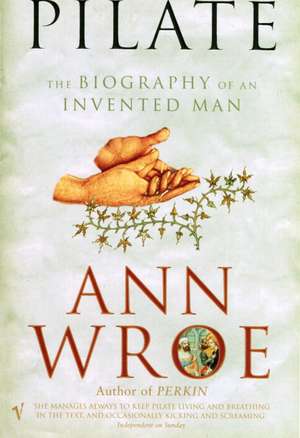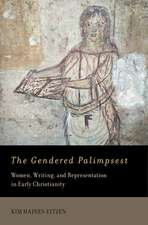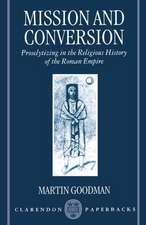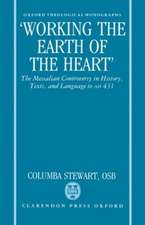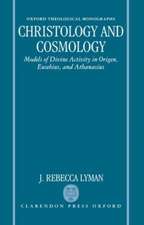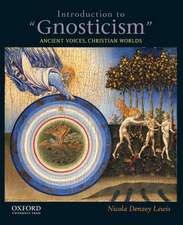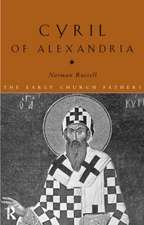Pilate
Autor Ann Wroeen Limba Engleză Paperback – 2 mar 2000
This is also the story, as far as it can be reconstructed from archaeology and from classical sources, of the real Pilate: his likely background, his career, his duties, his failings, his fears, and the attitude he might have had to the various forms of thinking he encountered in Judea. Ann Wroe shows how, in his struggles with fate and free will, Pilate's story has also become the story of ourselves.
Preț: 79.08 lei
Preț vechi: 94.77 lei
-17% Nou
Puncte Express: 119
Preț estimativ în valută:
15.13€ • 15.84$ • 12.52£
15.13€ • 15.84$ • 12.52£
Carte disponibilă
Livrare economică 20-26 martie
Livrare express 28 februarie-06 martie pentru 37.46 lei
Preluare comenzi: 021 569.72.76
Specificații
ISBN-13: 9780099287933
ISBN-10: 0099287935
Pagini: 416
Dimensiuni: 132 x 201 x 29 mm
Greutate: 0.29 kg
Ediția:New ed
Editura: Vintage Publishing
Locul publicării:United Kingdom
ISBN-10: 0099287935
Pagini: 416
Dimensiuni: 132 x 201 x 29 mm
Greutate: 0.29 kg
Ediția:New ed
Editura: Vintage Publishing
Locul publicării:United Kingdom
Recenzii
"The sheer skill of the writing... the touch of a master-novelist... Few have ever explored so imaginatively, or with such passionate attention to detail." - Sunday Telegraph
"Extraordinary and compelling." - Sunday Telegraph
"Ann Wroe's knowledge of the past 2,000 years is encyclopaedic--She manages to keep Pilate living and breathing in the text, and occasionally kicking and screaming." - Independent on Sunday
"Extraordinary and compelling." - Sunday Telegraph
"Ann Wroe's knowledge of the past 2,000 years is encyclopaedic--She manages to keep Pilate living and breathing in the text, and occasionally kicking and screaming." - Independent on Sunday
Notă biografică
Ann Wroe has a doctorate in Medieval History from Oxford. She is the American editor of The Economist and the author of Lives, Lies and the Iran-Contra Affair (1991), and A Fool and His Money (1995).
Extras
Chapter 5 -- The Great Equivocator
The intriguing thing about Pilate is the degree to which he tried to do the good thing rather than the bad. He commands our moral attention not because he was a bad man, but because he was so nearly a good man. One can imagine him agonising, seeing that Jesus had done nothing wrong, and wishing to release him. Just as easily, however, one can envisage Pilate's advisers telling him of the risks, warning him not to cause a riot or inflame Jewish opinion. It is a timeless parable of political life.
It is possible to view Pilate as the archetypal politician, caught on the horns of an age-old political dilemma. We know he did wrong, yet his is the struggle between what is right and what is expedient that has occurred throughout history. The Munich Agreement Of 1938 was a classic example of this, as were the debates surrounding the Great Reform Act Of 1832 and the Corn Laws. And it is not always clear, even in retrospect, what is, in truth, right. Should we do what appears principled or what is politically expedient? Do you apply a utilitarian rest or what is morally absolute?
Christianity is optimistic about the human condition, but not naive. It can identify what is good, but knows the capacity to do evil. I believe that the endless striving to do the one and avoid the other is the purpose of human existence. Through that comes progress.
—-TONY BLAIR, interview in the Sunday Telegraph, April 7, 1996
IT WAS DARK WHEN HE AWOKE. At the first cockcrow, at that time of year, the moon was often up and shining. At the second cockcrow, the gallicinium, night still hung in the silent trees. It must have been around four in the morning. A servant roused him, lighting the fire and opening the shutters to reveal the pale beginnings of the sunrise. The third legion in Syria had once adopted the local practice of saluting the rising sun; it had brought them luck in battle. The Acta Pilati imagined that Pilate, too, would have saluted it; later that day this account had him washing his hands "before the sun," the god of purification. Most later writers have liked to think that he ignored it, eyes screwed up, head aching from the fun of the night before; and that it was in this state, hungover and resentful, that he embarked on the day that was to seal his place in history.
In fact, it was not unconscionably early for him. Back in Rome it was not unusual for clients to get up and dress in the dark, in order to be the first to pay their morning respects to their patrons. Lawyers too started the court day at dawn, so that by three in the afternoon the business day would be over. Horace in one of his letters rejoiced in this arrangement: "At Rome it was long a pleasure and a habit to be up at dawn with open door, to set forth the law for clients." Others, to be sure, took a different view. Martial wrote that one of the chief delights of going to the country was that "the pale defendant will not break your sleep, and you can dream all through the morning." Bur Pilate's dreams had fled already, and the pale defendant was approaching.
There was not much dressing to be done. He had probably slept in his undertunic, as was the custom in cold weather. His shoes were by the bed; a servant put them on him and laced them. This was the first essential. To walk around barefoot was slovenly, and the marble floor was cold. He splashed his face, washed his teeth, passed water in a brass pot held by a slave, made sure his nails were clean. His official tunic with its broad purple stripe (a stripe that still smelled vaguely of shellfish dye) was put on him; a fresh toga was placed over his head and carefully arranged on his shoulders. He drank perhaps one glass of water, chewed a piece of bread. If he felt his breath was bad, he could pop in a freshening pastille; in later years, Cosmus' was the recommended brand. Then, seated in a chair by the window, he gave himself over to the attentions of his barber.
The light was still dim; too murky to see his stubble by and perhaps too bad to read if he had wanted to try. Lamps would be lit to illuminate the scene. The razor scraped across his chin, his cheeks, the nape of his neck. Water dripped in the basin. A little aromatic oil was smoothed across his hair. All this was perfectly normal, routine. Yet it was not just another day in his life. There were perhaps a hundred thousand people in the city, three times the normal population, and he was in the midst of trouble. The judgments he had to make would be easy at one level but vexed at another, when he had to consider how the crowd would react. He was keeping order like a soldier, but he had to be careful like a politician, and he was not good at this.
It was-to take one of the possible dates at random-the sixth before the Kalends of April. This was not in itself inauspicious. The unlucky days were those that immediately followed the Kalends, the Ides or the Nones; these, and some others, would be marked in his calendar with the letter N as nefastus, unlawful. On those days, in Rome, the courts could not open. Other days were partly lawful: on NP days (nefastus parte) the morning was unlawful, but if the gods were propitiated with sacrifice the afternoon could be used for court business; on EN days (endotereisi), hearings were allowed in the middle of the day. There remained the days, like this one, that were reminders of previous troubles. It is probable that the dates around Passover were already marked in his calendar with the special dots or seals proclaiming them unlucky, auspicio malo.
At such times, even an unsuperstitious man might start to look for auguries and signs: the wavering flight of birds, water spilled on a table, the left shoe put on unluckily before the right in the dark. If a man of great power were about to appear, palm trees would spring from cracks in the paving stones, put out suckers and draw wild pigeons to nest in their branches. Yellowing sprays of ilex or laurel suddenly revived. Eagles perched on the roofs of houses, or were seen flying where they had never ventured before. They fought with crows and defeated them. Some even swooped down to take food, as one had snatched a piece of bread from Augustus while he dined in a wood at the fourth milestone on the Campanian Road; after soaring to a prodigious height, it dived down again and returned it to him. Before the fall of Sejanus, crows had flocked around him and cawed as he took the auspices, and a weasel had darted through the crowd outside his house. Perhaps omens of this sort had already been spotted in Jerusalem, and Pilate, too busy, had missed them.
Even good omens had to be received correctly. A sneeze had to be greeted with "Salve!" "Good health!"-Tiberius insisted on this, even when out in his carriage. A sputtering lamp had to be calmed with a few careful drops of wine, an empty eggshell pierced or crushed as soon as the egg had been eaten. A bad omen—even one as slight as a misformed cloud, a dropped glass, a horse stumbling-called for certain precautions. To ensure your physical safety you could touch your hand to your heart, murmuring "Salvum sit, quod tango," "May what I touch be safe." You could rebuff the evil omens by saying "Longe a nobis," "Be far from us," sprinkle wine under the table, or change the rings on your right hand. If you were at dinner, you could kiss the table; at home, you could kiss the shrine of the household gods, wishing all the while for the horror to stay away.
Pilate that morning would probably have stood before the shrine anyway, with his head covered and with as many members of his household as he could gather, to pour out the wine and make the morning invocations. This was how the business day started. His statuettes of household gods would probably have traveled with him from Caesarea, as Aeneas' gods journeyed with him from Troy to Latium. And they would have included a little bronze or gold Tiberius, perhaps the one to whom Pilate directed his most earnest prayers. It did not need to take long: "Bene nos, been te, pater pacriae, optime Caesar," was the brief and acceptable form. He would touch the altar as he prayed, or lift his arms, palms upward; the burning grains of incense crackled in a bowl. Servants, or children if he had any, might deck the little statues with flowers clumsily knotted together. He could give an extra touch to Apollo, the god of good luck. And perhaps all that would be enough to keep him safe.
He was probably forewarned of the delegation that brought Jesus to the palace. Since his first question to the chief priests, inquiring about the charges, was a formal one, it did not necessarily mean he was ignorant of the case. When Paul was tried before Felix and later before Festus, the Roman governor on each occasion asked the accusers to bring their complaints to him beforehand. This was how the medieval writers imagined the case of Jesus was handled.
In the York play, Annas, Caiaphas and a Jewish doctor come to Pilate complaining about Jesus before Judas has even thought of selling him. Pilate agrees that "if that wretch in our ward has wrought any wrong" he will act. But he feels they are too angry, doesn't quite understand. "Isn't he the one you said would come down to help you?" he asks. This prompts an exasperated remark from Caiaphas: "Ah, please, sit, shut up."
On the evening before the trial, according to the fourth-century fantasies of the Acta Pilati, Pilate sat up late discussing the case of Jesus with Caiaphas, Levi, Nephlahim and the rest of the chief priests. Together, they were drawing up a charge sheet against him; or rather, the priests were arguing the charges among themselves, while Pilate sat in bewilderment. He was still unconvinced of the danger of Jesus, and the priests were furious at his obtuseness. "Well, then," they cried, "we beseech your Majesty to summon him here before your judgment seat and examine him properly. Then you can find out yourself whether what we are saying is true or not."
"Tell me: how can I, a governor, examine a king?" asked Pilate.
"We're not calling him a king. That's what he says of himself," said the priests.
Pilate decided to summon Jesus. He called a messenger and ordered Jesus to be brought to him, "but with gentleness." Then, taking off his own cloak, he handed it to the messenger. "Go and show this to Jesus," he told him, "and say, 'Pilate the governor asks you to come to him.'"
The messenger went out and, when he found Jesus, knelt and worshipped him. He spread Pilate's cloak on the dusty ground, one more robe on the Messiah's path of triumph, and invited him to dismount and come to the praetorium. "Lord," he said, "walk on this robe and come this way, for the governor calls you."
Jesus began to follow him. Meanwhile, the Pilate of the Acta waited in the praetorium. In the center stood the judgment seat; around the walls, the golden standards. Pilate had removed them from the public gaze to display them here, as if in a private sanctuary. Sometimes they were fixed to the walls; sometimes, as on this day, each was held by an unmoving guard. The early sun gave them the barest illumination. And among them, furious, stood the chief priests. The Acta and the medieval plays, heedless of the laws of ritual impurity, always put the priests right in with Pilate, even letting them give him elementary Hebrew lessons, while they waited for Jesus to appear. They had much to upbraid him about. "Why did you send a messenger to get him?" they cried. "That messenger spread your robe on the ground and let him walk on it like a king! Why on earth do you think him worthy of an honour like that?"
As Pilate tried to explain himself, there was a commotion at the door. The guest, or rather the prisoner, was arriving. Pilate tensed himself instinctively. But then, all of a sudden, something else happened. The standards along the wall bowed down, a long rippling wave of white and gold crested with brass. They made obeisance right to the floor, coiling like bright snakes from the arms of their astonished handlers.
The banners bowed down in the York play, too, and Pilate leaped from his seat. He was terrified. "What the hell are you doing?" he cried. "You're bowing to this wretch? Are you mad? Put them up again!"
"Sir, we had nothing to do with it, sit!"
"The standards bowed themselves, sit! We couldn't hold them-we tried-"
"Take the prisoner back," ordered Pilate, in a cold fury. "And put the standards up again. Now"-he snapped his fingers for a centurion, who came running-I want six men to every standard. I want you to hold them here, right in front of the judgement seat. If they bend one hair's breadth when the prisoner is brought in, I swear by the safety of Caesar that I will cut off your heads. Is that understood?"
"Sir."
The reinforcements crowded in, six to each standard, their bodies contorted like wrestlers at a fair. The York Pilate did a tour of inspection, shaking the standards himself; they did not bend.
"I'm holding mine straight as a line, sir!"
"If mine goes the wrong way, you can hack off my hand, sir!"
"All right, you boasters. Don't pull any fast ones on me."
Pilate returned to his chair. He stared for a while at the monoliths before him. Then he snapped his fingers for Jesus to return. The messenger did exactly as he had done before: he spread Pilate's cloak on the ground and, with many entreaties, persuaded Jesus to walk on it. The two entered the praetorium again. At that moment, the shafts shook; the standards shivered, as though the muscled arms of the guards were no more than gossamer threads; and again they bowed to the floor, from which no man could raise them.
Something happened to Pilate, too. Involuntarily he rose from his chair. He found himself standing, slightly distant and light-headed, as if in a dream of devotion. And he could not speak.
"What's up, sir?"
The centurion was holding his arm; the moment was over. Pilate murmured, sitting down again, with a nervous little laugh: "Didn't really mean to do that. It was out of my power. I just felt I had to worship him. Something like that . . . I never saw something like that before."
"We couldn't think what had got into you!" Caiaphas laughed. "Reverencing that ribald."
"I couldn't help it, I tell you. It was out of my power ... But listen, listen. I think he should go away. I'm afraid to offend him ... really."
Astonished, the Jews ignored him. The hall was cleared, but the standards were left against the wall. Pilate had promised bloodshed if they bowed again, but it seemed that everyone had been traumatized enough; and he had forgotten the logic of his order.
Besides, the prisoner stood before him.
II.
Pilate presided that day, as always, "with power," cum potestate. He was the emperor's agent, invested with full civil, military and criminal jurisdiction. He did not judge all cases: the Jews had been left with considerable autonomy. But he had the power of review, and in general the more serious the charge, the more likely he was to handle it. This was true even in religious cases. Later, in the early 60s when Albinus was governor, Jesus the son of Ananias went berserk and ran through Jerusalem screaming of "voices" coming out of the west and the east; the priests took him to Albinus to get him silenced, as if this were their only hope.
This would not have made the governor comfortable. When the Jews brought Paul to Seneca's brother Gallio, proconsul of Achaea in 51-52, and accused him of "making men worship God contrary to the law," Gallio instantly cut them off before Paul could open his mouth. "If it were a matter of real wrong or wickedness, you Jews," he said, "it would be reasonable for me to involve myself. But if it is a question of words and names, and of your law, deal with it yourselves. I will be no judge of such matters." And he drove them away from his judgment seat. Some Greeks then approached him as he sat there and, in front of his chair, beat up the chief ruler of the synagogue. "But Gallio," said Luke, "cared for none of those things." They should never have brought the case to him and, if they lynched someone at the end of it, he could not be less bothered.
As he walked through the palace, Pilate probably felt much the same. He, too, would suspect that at least some of the charges that morning arose from "words and names": from those strange Messianic slogans that had been shouted out when Jesus entered Jerusalem. And this may have been why the Gospels show him initiating no proceedings on his own account, but waiting-with no great enthusiasm-for the case to be laid at his door by the Jewish priests.
Insofar as there was a Roman charge at issue here, it was maiestas again. In the case of noncitizens, this was automatically punishable by crucifixion. It was also an exceedingly broad charge ("an ambiguous term," Cicero called it), which vaguely included any act prejudicial to the interests of the Roman people and admitted no easy defense. Had Pilate been commanding troops in the field, no procedures would have been necessary: he would have disposed of the matter with his ius gladii, summary executions and crucifixions without trial. Both Philo and the Samaritans later accused him of partiality for acting this way, and he may well have had a soldier's instinctive liking for it. A strong body of opinion still holds that the trial of Jesus was not a trial at all, just a farce: Pope John Paul II has condemned it as "an illegitimate tribunal." But Jerusalem, for all its difficulties, was not a battlefield. Correct form had to be followed. And since the city was bursting with dignitaries who could report to Rome any high-handed action by the governor, Pilate had an extra motive for being careful.
By all appearances, the trial of Jesus was correctly conducted according to the rules of cognitio extra ordinem, the criminal-justice procedure commonly in use in provinces like Judea. Extra ordinem meant there was no need to follow the law books word for word; Pilate could use his own discretion. The wrongness of the verdict-if indeed it was wrong—did not make the proceedings themselves illegitimate.
A trial of this sort was abbreviated, closer to a simple hearing, as befitted noncitizens who had no rights before the law to speak of. There was no need, for example, for a written version of the accusation. Nor was there a jury, as there would have been in Rome; Pilate was both the judge and the jury. But there still had to be a formal accusatio, or statement of the charge; a cognitio, or inquiry into that charge, either by a panel of justices or by the governor himself; statements from witnesses, and some opportunity (typically, three chances) for the accused to defend himself before sentence was passed. It was possibly routine procedure for a governor to accept charges brought by other authorities without further inquiry, but not in a case involving the death penalty. As the governor Festus proudly explained to the Jews, "It is not the manner of the Romans to deliver any man to die, before he who is accused has faced his accusers and been able to answer for himself concerning the crimes laid against him."
In this case, the case of Jesus the Nazarene, the Sanhedrin had already made their own preliminary enquiries of the largely silent suspect. (Luke records: "Are you the Christ? Are you the Son of God?" And then Caiaphas's despairing exclamation, "What need have we of further evidence?") As a result of these, they had decided that Jesus should die for blasphemy. Mark's Gospel says they also tried to gather witnesses for Pilate's trial, but in a portent of what was to come most of those witnesses had disagreed with each other, and even those who remembered Jesus's remarks about destroying the Temple garbled them, and got them wrong.
In the gray light, groggy with lack of sleep, the small group of elders and priests now toiled up the hill to the governor's palace. Writers used to imagine the praetorium as part of the Antonia, the Roman military headquarters: a grimly utilitarian place. This background, with soldiers armed and waiting, added to the underlying brutality of the trial. Filmmakers made good use of it, imagining an empty, echoing interrogation chamber of bare stone containing a chair and, incongruously, an executive's desk with inkstands. But the judgment hall was almost certainly in Herod's palace: a luxurious, even surreal, setting of mosaic pavements, white marble balustrades, softly sweeping servants and the intermittent fluttering of doves. To the east, over the city, the sun was rising.
The scene that followed is given differently in each Gospel. It is impossible to tell how much history is preserved there. The Gospel accounts, and John's in particular, are theology rather than history: the writers wished to show the clash predicted by Jesus between the powers of darkness and the powers of light, between Truth and men, like Pilate, who would never grasp it. The evangelists were not interested in characterizing the governor. The four Pilate of the Gospel trial differ mostly in what they do, not in what they are, and they differ in what they do because they react to the widely varying characters given to Jesus. The Pilate of Mark and Matthew is abrupt and practical because the Jesus of Mark and Matthew, the suffering servant, has nothing to say to this ruler who must brutalize him. The Pilate of Luke, a desperate conciliator, seems to take his cue from Luke's healer-Jesus. The Pilate of John is both brimming with arrogance and touched by anxiety, because he is dealing with a Jesus who is patently king and patently God. The governor probably spoke very few of the words the evangelists, and John especially, gave him. It was what he symbolized that mattered.
Yet for generations the tortuous Gospel accounts of the trial were broadly accepted as historical and true: so true that the words of the chief players remained unaltered even by the medieval playwrights, who altered everything. They reveled in the story of the Roman governor who could not decide between right and wrong, truth and falsehood: because Pilate, in this case, was all men. And other ages have followed them. The stilted "conversations" between Pilate and Jesus have been treated as the most sacred of sacred texts, and every scholar has found a sort of thrill in retranslating them, sucking the juice out of them, uncovering every possible nuance of meaning. It was the Victorians who rejoiced to discover that when Pilate appeared to say the same thing over and over again, it was in fact never quite the same; and from those tiny differences sprang a whole psychology of doubting.
In striking contrast, Josephus in the "Testimonium Flavianum" makes it all seem practical and simple. "Pilate condemned him to the cross upon indictment of the first-ranking men among us." No hesitation, no deviation. This may well have been what the real trial of Jesus was like. Perhaps-as many suppose-the Gospel-writers invented a vacillating Pilate only to make the Roman judge more sympathetic and the Jews worse. They had a reason for doing so, to make the vulnerable new religion more palatable to the empire. If they could not get around the fact of the Roman execution carried out by Roman troops, they could at least make Pilate waver and wonder until his hand was forced by the Jews.
There is plenty in that, as we shall see later. But the Pilate of the Gospels is not just a Roman judge whose character must be softened for political reasons. That is almost the least of the roles he plays. He is also a symbol of the state, the secular power, the material world, ignorance and darkness. He is all men facing, considering and ultimately rejecting Truth. That is why, though many modern scholars favor the kangaroo court and the instant death sentence, people continue to cling to Pilate as the great equivocator. Like an audience at a show, they love to watch him teeter, struggle, almost save himself, and fall. In some sense, they feel they are watching themselves.
